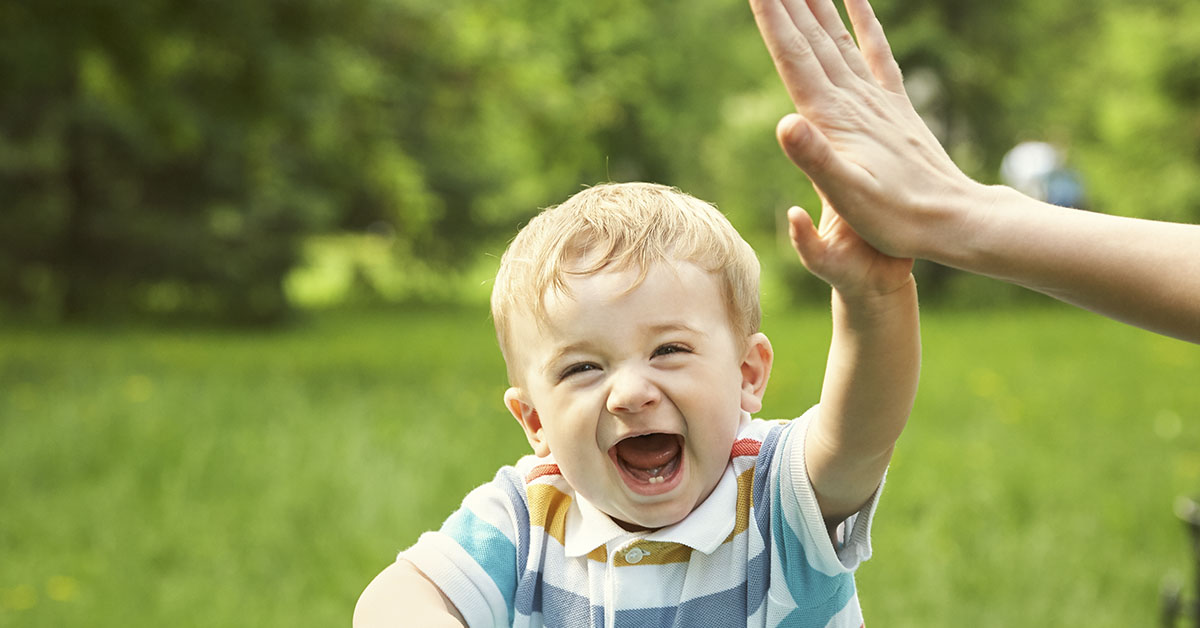In an act of celebration, we often pat our kids on the backs, give them hugs, or high-five them. We’ve always thought this was a way to enforce good behavior or give them a sense of pride for their accomplishments. However, it turns out that, according to John Rosemond, giving kids a high-five can have adverse effects. Many experts and parents have weighed in on the matter, sparking quite a bit of debate.
Anti-High-Five
According to the parenting columnist and author, you should not high-five anyone who is not your equal. Rosemond provides several examples writing, “The high-five is NOT appropriate between doctor and patient, judge and defendant, POTUS and a person not old enough to vote (POTUS and anyone, for that matter), employer and employee, parent and child, grandparent and grandchild.” He goes on to explain that learning to respect adults is an important part of “healthy character development.” In his column, he writes, “The child who is allowed to high-five an adult has tacit permission to talk to said adult as if they are peers. Do not wonder why, if you high-five your child, he often talks to you as if you are his equal.“
Experts’ Opinions of a High-Five
Many of the parents who’ve commented in regard to giving a child a high-five. Most of these parents are also specialists in psychology and, or earl human development. Dr. Lisa Lindquist is a mom and psychiatrist living in Alaska. The mental health expert explains that celebrating children is a “complex social communication“. She tells TODAY, “This provides a child with a sense of competent achievement and allows them to understand where to direct their efforts during future tasks.”
Linquist then follows that up with a message to parents everywhere. “So please, utilize the occasional congratulatory high-five as you tell your first grader, they worked hard to solve the math problems in their workbook this evening.” She does say she agrees that children should learn to treat others with respect. However, there is little evidence to back the idea that a high-five has any correlation with how children treat their elders or peers.
Read: ‘I’m a Solo, Childless Flyer, and No, I Don’t Want to Switch Plane Seats with You’
Lindquist says she doesn’t agree with Rosemond’s overall message. “I disagree that gestures of respect are reserved exclusively for those one perceives as an equal, and the sentiment that respect from another is earned by demonstrating one’s superiority,” Lindquist said. “Instead of modeling respect, the actions described by Mr. Rosemond teach, at best obedience, and at worst contempt.”
Another mom living in Washington, Nicole Kern also weighed in. Nicole Kern has a doctorate in psychology and is currently working as a school psychologist. She says that John Rosemond may be out of touch with how children function or operate. She told TODAY, “One thing that helps is not denying them access to contact with adults, be that physical or emotional, when the child seeks such a connection. I would never deny a child something as basic as a high-five.”
Previous Controversy
Redmond has sparked controversy before with his ideas. The anti-high-five columnist published an article. In the column, he explains that he believes ADHD isn’t a real diagnosis. He says, he and a co-author, Bose Ravenel published a study in 2009. Bose Ravenel is a pediatrician and former medical school professor. The pair argued that ADHD and other learning disorders are “inventions of the psychological-psychiatric-pharmaceutical industry.”
It’s important to note that Rosemond is 74 years old. Although he does have a Mater’s in Psychology, he likely got his credentials a while ago and there is new evidence emerging all the time. Redmond left his private practice in North Carolina to tour the country as a “parenting expert” and journalist. Several studies have been done in the last several years to understand early human development.
An example of a study was one done by Notre Dame. They explain the importance of human contact, in order to raise happy and mentally healthy children. Be it a high-five, a hug, or a pat on the back, children need to feel nurtured. We now understand the importance of treating children as people, albeit tiny people who need some guidance. Because of these new realizations, many practices may be considered outdated.
Keep Reading: Jerry Springer expresses remorse over his controversial talk show: ‘I just apologise’
Sources
- “The bad boy of child-rearing. ” The Washington Post. Jennifer Huget. January 20, 2014.
- “A parenting columnist says adults shouldn’t high-five kids. yes, really.” TODAY. Danielle Campoamor. October 4, 2022.

